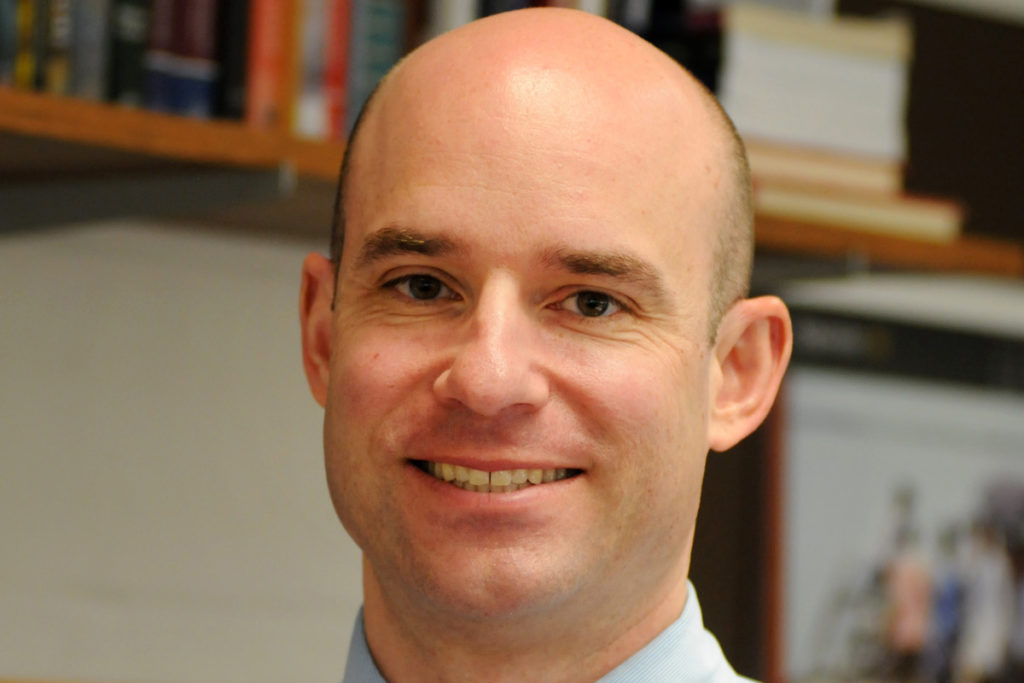GW is continuing to participate in Moderna’s trial of its COVID-19 vaccine, contributing data that led up to federal regulators’ approval of a booster shot for all adults this past week.
The University launched coronavirus vaccine centers last August to begin the two-year study, which Moderna dubbed “SpikeVax,” garnering a diverse group of 350 volunteers who monitored their symptoms after taking either a placebo or the vaccine. David Diemert, a professor of medicine and the principal investigator for the trial at the GW site, said researchers began administering booster shots at the end of September after finding the two-dose regimen to be safe and highly effective.
“The data already has been turned into something exceedingly valuable to all people – an extremely effective vaccine that has already contributed immensely to the control of the COVID-19 pandemic throughout the world,” Diemert said in an email. “The participants in the study at GW have been critical players in this. Without them, we would not have been able to get to the point where SpikeVax has been authorized or approved by multiple countries around the world.”
The Centers for Disease Control and Prevention endorsed Moderna and Pfizer’s coronavirus booster shots for all adults Friday, widening booster eligibility after previously approving the shots for individuals at higher risk. Nearly 175 million doses of Moderna’s vaccine have been administered nationwide, according to the CDC.
Diemert said he and the 30-member team expect to finish administering the booster doses by the first week of December. Participants complete study visits four weeks and six months after receiving their boosters for researchers to collect antibody and safety data, he said.
The effort is a collaboration between the wings of GW’s medical enterprise – the School of Medicine and Health Sciences recruited participants, the Medical Faculty Associates assesses participants’ symptoms and the Milken Institute School of Public Health contributes data and fiscal management, Diemert said.
He said more than 50 percent of GW’s participants are people of color, and researchers have retained more than 90 percent of the initial group. A few volunteers withdrew last December to learn whether they had received the placebo and could subsequently receive the Pfizer vaccine, and some withdrew near the start of the semester to receive a booster dose before it had been added to the trial, he said.
“Overall, though, we’ve had good retention of participants in the study,” Diemert said.
Diemert said the team will follow the participants through phone calls for 25 months after their enrollment. He said researchers will see the last participant for their final check-up in January 2023.
“The overall goal is to conduct the Phase 3 trial according to the highest ethical and clinical standards, which means primarily to protect the safety and rights of our study participants, but also to ensure that the data being collected is rigorous, reliable and complete,” Diemert said.
Medical and public health experts said logistical aspects of the Phase 3 trial, like patient check-ins and constant data collection, make the study difficult for participants and clinicians but will confirm the effectiveness of the SpikeVax vaccine.
Jeffrey Klausner, a professor of medicine and population and public health sciences at the University of Southern California, said although trials can be frustrating for patients who must regularly travel to clinics and wait for results and reimbursement, many participants enjoy “contributing to help others.”
“The biggest challenge is keeping people in the trial for follow-up over a long time,” Klausner said in an email. “Many people become tired of coming back for visits and evaluations.”
James Dingam, a professor of public health sciences at the University of Chicago, said after the Phase 3 trial ends, he predicts that the Food and Drug Administration will conduct a follow-up study of participants who received the vaccine to monitor its efficacy in the longer term.
“I think that there will be requirements from the FDA with full approval that they do this sort of phase four follow up, but not a lot is expected out of that, any real negative things, but they probably still be required to do it,” Dignam said.
Dignam said recruiting participants who are representative of the general population based on race, gender, ethnicity and even location is critical to make sure the vaccine is safe for everyone.
“It’s actually something that’s required to at least report on the demographics and if possible explore whether there’s a differential benefit or risk based on those kind of groupings,” he said.
Paul Beninger, a professor of public health and community medicine at Tufts University, said logistics can be a challenge for many trials, both on the clinical side with recruiting volunteers and on the patients’ side with randomized assignments for treatment. He said researchers need a sophisticated “infrastructure of computers” and knowledgeable clinicians to monitor the patients.
Beninger said although vaccine approval and distribution occurred much faster than for most vaccines, which can take five to 10 years, that should not affect the safety of the vaccine.
“Because it’s a pandemic, we’re trying to vaccinate a huge number of people, so we’ve again telescoped everything into a really short period of time,” Beninger said. “And if anything was going to happen, it would have happened well within 100 million people.”








